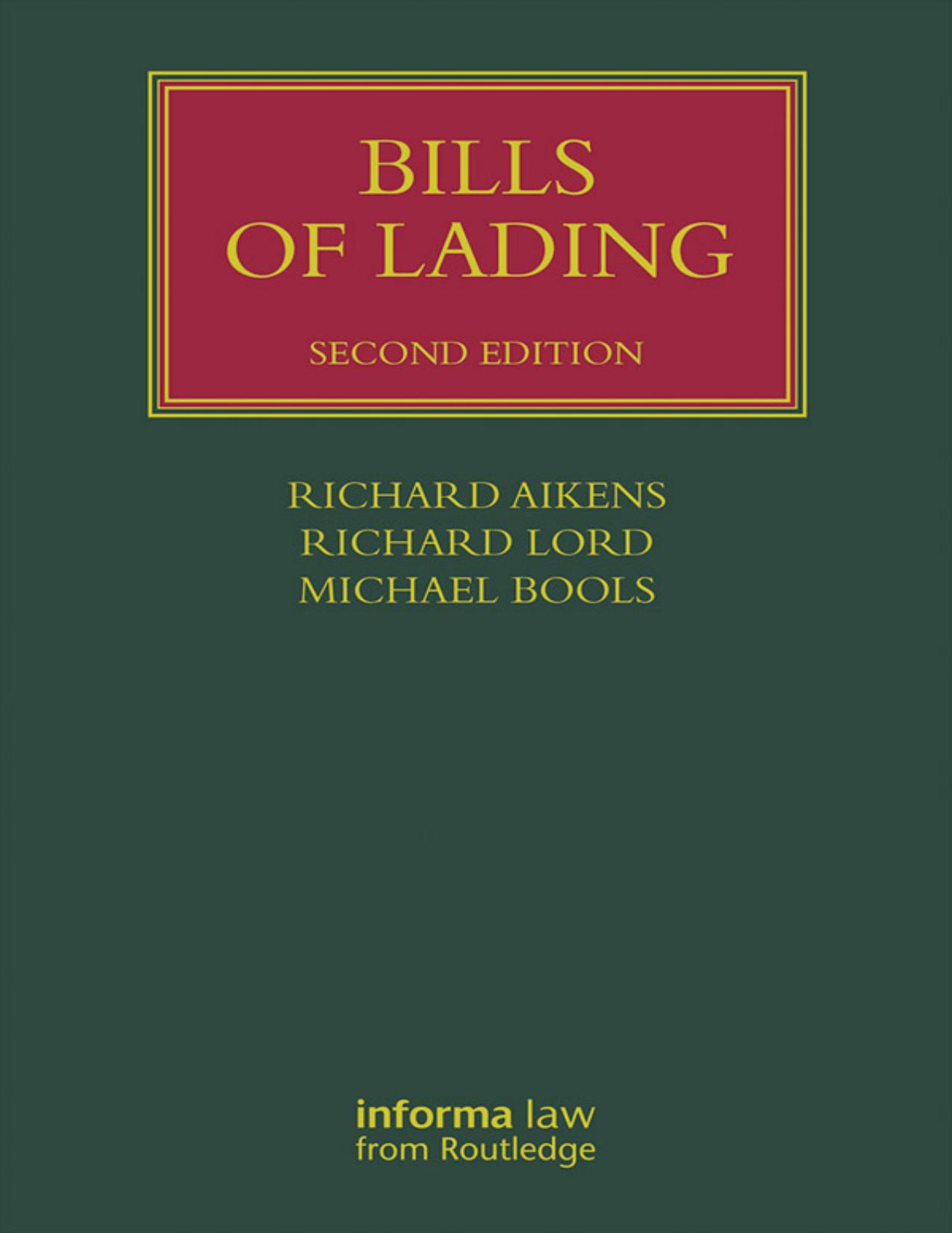Bills of Lading by Aikens Richard Lord Richard Bools Michael & Richard Lord & Michael Bools

Author:Aikens, Richard,Lord, Richard,Bools, Michael & Richard Lord & Michael Bools [Richard Aikens]
Language: eng
Format: epub, pdf
Publisher: Taylor & Francis Ltd
Published: 2015-12-31T05:00:00+00:00
9.46 A’s consent is not necessary to effect an attornment by B to D101 in the sense of creating an obligation owed by B to D. However, without such consent B will be liable to A for breach of the original terms of the bailment if he delivers to D’s order not A’s order, and in practice B’s action in attorning to D will almost invariably be at the direction of A.102 Attornment operates as an estoppel as between B and D rather than a form of “novation” of the relationship of bailment. The attornment gives D, who becomes a bailor for this purpose, rights (at least) to damages as against B, but gives no absolute right to the goods.
9.47 Attornment is only effective if the “acknowledgement” is communicated to D.103 If A delivers goods to B with an instruction to deliver to D104 this may make D the original bailor if A acts as D’s agent but these facts do not in themselves constitute attornment.105
9.48 The effect of attornment is that D irrevocably becomes the bailor in substitution for A,106 and B is estopped from denying D’s rights in relation to the goods.
9.49 There is no reason why in general the simple act of attornment should mean that B’s new relationship as bailee of D should be on the same terms as the original relationship as bailee of A. However, in The Aliakmon and Compania Portorafti Commerciale S.A. v Ultramar Panama Inc. (The Captain Gregos) (No. 2) the courts considered that any attornment would be on the bill of lading terms. Apart from the consideration of commercial expediency, it has been suggested this could be justified on the basis of a normal assignment, incorporation of terms by reference or bailment on terms.107 This question is bound up with that of bailment on terms, considered below. If originally there is a bailment on terms, then the relationship between the attornor (B) and the attornee (D) can in principle be on the same terms but only if D consents, expressly or impliedly, to those terms.
9.50 In The Aliakmon Lord Brandon pointed out108 that the mere transfer of a bill of lading did not itself constitute an attornment. But in The Berge Sisar Lord Hobhouse stated that a bill “carried with it a transferable attornment”.109 The Court of Appeal in East West described this subject as “a difficult area”.110 Plainly the act of attornment cannot be “transferable” in the normal sense. Lord Hobhouse is more likely to have meant by that phrase that if the carrier, as bailee, issues an “order” bill, it acknowledges that its transfer will operate in a way akin to an attornment in the sense that it may transfer to the transferee the transferor’s right to possession of the cargo as against the carrier. Such a transfer may occur numerous times where a cargo is sold several times during a voyage. This concept has also been referred to as “attornment in advance”.111
Download
Bills of Lading by Aikens Richard Lord Richard Bools Michael & Richard Lord & Michael Bools.pdf
This site does not store any files on its server. We only index and link to content provided by other sites. Please contact the content providers to delete copyright contents if any and email us, we'll remove relevant links or contents immediately.
Last Narco by Beith Malcolm(1566)
Steroids: History, Science, and Issues by Standora Joan E.; Bogomolnik Alex; Slugocki Malgorzata(1524)
A Practical Guide to International Arbitration in London by Hilary Heilbron(1441)
Adrift by Steven Callahan(1356)
Reclaiming History by Vincent Bugliosi(1345)
40 Days and 40 Nights by Matthew Chapman(1345)
Introduction to the study and practice of law in a nutshell by Kenney F. Hegland(1334)
Poisoned by Jeff Benedict(1314)
The Nuremberg Interviews by Leon Goldensohn(1309)
Persuasion by Owner(1300)
Dog Company: A True Story of American Soldiers Abandoned by Their High Command by Lynn Vincent & Roger Hill(1267)
The New Whistleblower's Handbook by Stephen Kohn(1234)
Lincoln's Code by John Fabian Witt(1195)
Eichmann in Jerusalem by Hannah Arendt(1169)
Kafka's Last Trial by Benjamin Balint(1169)
Japanese War Crimes during World War II: Atrocity and the Psychology of Collective Violence by Frank Jacob(1107)
A Passing Fury by A. T. Williams(1075)
Dog Company: A True Story of American Soldiers Abandoned by Their High Command by Roger Hill & Lynn Vincent(1068)
A Court of Refuge by Ginger Lerner-Wren & Rebecca A. Eckland(1049)
